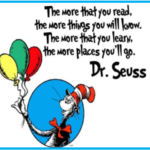Ways To Support Your Child’s Reading Development:
Research has shown that children’s motivation and achievement improve when their parents and carers are involved in their education. There are many everyday things you can do to encourage your child to read and improve their literacy.
- Make reading a daily habit by setting aside 10-15 minutes every day for reading. Students who read more, read and write better.
- Let your child choose the books he/she is interested in.
- Be a reading role model and let your children see you reading—for enjoyment, for information, for news, online, etc. This reinforces that we need to be able to read for many different purposes.
- Encourage your child to read and view a variety of texts such as newspapers, novels, comics, magazines, websites, instructions, recipes, etc.
- Remember to focus on what your child is doing well when reading, rather than what they are doing wrong.
- Visit bookshops and libraries. Talk to your children about reading and books, and what they like to read. Maybe read the same book and discuss it. Make it fun.
- Have a place in your home for your family’s books. Show that they are special and important to your family.
- Set up a comfortable area where your children can read with you or with other siblings.
- Do not force your child to read aloud if they do not feel confident. Remember reading is about making meaning rather than saying words. Read books aloud, take turns to read independently. Whatever is most appropriate.
- Fill your home with lots of different reading materials. Encourage your children to try new and challenging books/texts. Remember reading from a screen is a more difficult skill and different from reading paper based texts.
- Discuss new and unusual words or phrases. Encourage your children to write down new words they encounter and find out what they mean. Write down difficult words and practise spelling them. Play games that develop vocabulary such as Scrabble.
- Encourage your child to make predictions about books/texts before reading and talk about what they learnt or discovered after finishing reading.
- Read to them as part of your bedtime routine.
Efficient readers are active as they read. They use a range of strategies to identify unknown words and comprehend text. These include:
- Clarifying the purpose or goal of reading the text
- Skimming or looking through the text before reading
- Making predictions about what might come next
- Making connections to what they already know
- Working out what information is most important in the text
- Re-reading any information that is important or difficult to understand
- Asking questions about the text
- Making inferences about information not explicitly stated in the text. Paraphrasing or summarising the information read
- Scanning when looking for some specific information
- Reading on to the end of a sentence to gain meaning, rather than being stuck on an unfamiliar word
- Sounding out unfamiliar words

To be numerate is to confidently and effectively use mathematics to meet the everyday demands of life.
Why is numeracy important?
Numeracy enables you to develop logical thinking and reasoning strategies in your daily life. We need numeracy to solve problems and make sense of time, numbers, patterns and shapes for activities like cooking, reading a map or bill, reading instructions and even playing sport.
Ways to support your child’s numeracy development
Research has shown that children’s motivation and achievement improve when their parents or carers are involved in their education.
There are many everyday things you can do to encourage numeracy learning. These include:
- Speaking positively about mathematics/numeracy
- Encouraging your child to use mathematical language—how much, how big, how small, how many
- Discussing the use of numbers, patterns and shapes in your day-to-day life—numbers found on library books, spatial patterns or shapes in the home and architecture
- Talking about occasions when you are using mathematics in daily jobs and real-life situations—cooking, map reading, building and playing sport
- Exploring situations using money such as shopping, budgets and credit cards
- Estimating, measuring and comparing lengths and heights, how heavy or light things are and how much containers hold
- Talking about different ways to solve a problem
- Using everyday tools like tape measures or kitchen scales and discussing the units of measure
- Asking ‘does that make sense?’, ‘is the answer reasonable?’ or ‘what other ways could we do this?’
- Observing and using timetables, calendars and clocks for different purposes like study periods, holiday planning and catching public transport
- Helping your child to work out how much things cost and what change they will receive
- Building your child’s confidence in Maths and helping them believe they can succeed
- Encouraging your child to know their times tables and how they arrive at each answer; it helps them become a more powerful thinker
- Talk to your child’s Maths teacher if they are unsure about an aspect of Mathematics
- Play games with your child that help them learn to estimate things by length or weight
- Encourage your child to understand the value of numbers e.g. the ‘6’ in ‘60’ is 6 lots of 10
